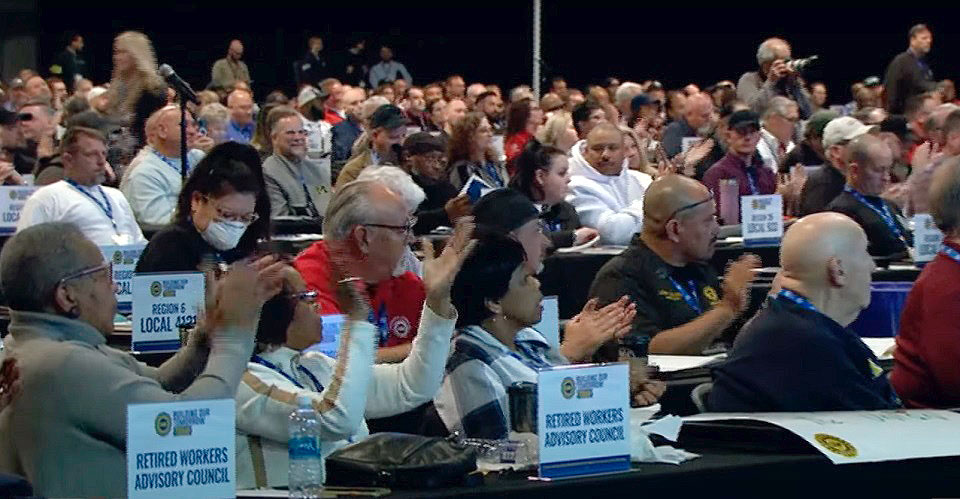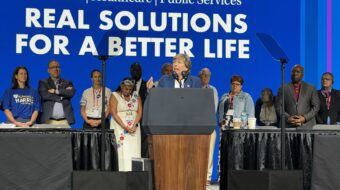
DETROIT—In his first speech as the union’s first-ever popularly elected president, FiatChrysler/ Stellantis worker Shawn Fain signaled the United Auto Workers would have a more militant attitude towards the Detroit 3 when contract talks begin this year.
“We are united to serve you,” he told the 600 delegates to the union’s special Bargaining Convention in his keynote address in Detroit. “We’re here to come together to ready ourselves for the war against our one and only true enemy: Multibillion dollar corporations and employers that refuse to give our members their fair share.”
That fair share, the convention’s resolutions book says, features the elimination of the two-tier wage system the Detroit 3 imposed on workers, starting 15 years ago. Feelings on that point were stirred by a film of what happened at the first two-tier plant, in Belvidere, Ill. People’s World covered that story as it was happening. At Belvidere workers made Jeeps.
The tiers split the workforce and produced a drastic economic drop in the town, as workers toiled side by side with one making top scale with benefits—such as a pension and health care—and the next one making half of that with no pension and limited health care.
And Stellantis made things worse by announcing just before the convention began that the Belvidere Jeep plant is being idled, indefinitely.
“The biggest thing is how calm the convention is,” one local official said. Delegates from both Fain’s UAW-D (Unite All Workers for Democracy) group and the longtime rulers, the Administration Caucus, agreed on overall goals, led by the elimination of two-tier wage scales, restoration of cost of living increases, and better health benefits for retirees.
They didn’t set specific numbers in the bargaining resolution, though, nor lay down markers such as “if you don’t agree to” ending two-tier by a certain date, a strike will occur. That, constitutionally, must be left up to the members to decide, after a tentative agreement is negotiated.
The UAW Bargaining Convention is important for workers nationwide for several reasons. The leading one is two-tier, which bosses, at first under the guise of “merit pay,” have used for at least 20 years to divide and conquer workers.
Second is that both UAW and the Teamsters’ big contract with United Parcel Service—the largest single private-sector pact in the U.S., covering 325,000 workers—also expires this year. UPS too has two-tier, and the Teamsters’ new insurgent president, Sean O’Brien, has been touring the country warning his UPS members to prepare for a strike over the issue.
And the third is the UAW’s contract, whether it’s a “pattern” pact within the auto industry or not, often serves as a “pattern” blueprint for other contracts around the country—which non-union competitors sometimes try to match, at least in pay. Fain has been closed-mouthed about whether there would be a “pattern” pact this time around.
After thanking his predecessor, Ray Curry—whom Fain narrowly beat in the union’s first-ever one-member-one-vote election–for his service, Fain declared: “When given the chance to vote, the membership chose change, and we choose to fight.”
“We have the will to sacrifice for the greater good, including on the picket line,” Fain stated.
Delegates on both sides of the Fain-Curry race appeared to agree, keeping proceedings on the convention’s first two days relatively low key. “I was with Ray Curry all the way. But Shawn Fain’s my president now,” one delegate said from the floor.
“I’m with the UAW,” not either side, said new Ford Department vice president/board member Mike Booth, a Fain ally. And the new chief of the old-line Administration Caucus, Vice President Chuck Browning, told a closed-door meeting of his remaining leaders, “Hey, we gotta pull together.”
The mood against the companies—GM, Ford, and FiatChrysler/Stellantis—was another matter.
YouTube video courtesy of the UAW
The UAW’s contracts with the Detroit 3 expire Sept. 14, and Fain gave no indication whether the new UAW reformer-majority board would pick one firm for bargaining a “pattern” contract, as past UAW bargainers have done.
They will have an extra lever this time, though. UAW-Canada, now called Unifor, has arranged that its contracts with the Detroit 3, covering their plants across the river in Windsor, Ont., and elsewhere in Canada, expire on that same day.
This time, convention delegates “are saying we may have to strike” to achieve their goals, the local leader said. “They’re telling the leaders ‘go ahead and fight for it,’” one UAW local insider reported.
The new board apparently recognized that, too. In the last regular convention, the old Caucus-dominated board flip-flopped on strike benefits, first raising them to $500/week and then cutting them back to $400. This board, meeting the day before the convention began, voted unanimously for $500.
Harkening back to UAW’s role in the long fights for civil rights, and legendary President Walter Reuther’s close working relationship with Dr. Martin Luther King Jr., Fain cited King liberally during his keynote address—including stresses and strains the civil rights movement underwent as it moved from political rights in 1964-65 to fighting for economic rights.
“Our union is moving from rights on paper to rights in action,” Fain told the delegates.
“We have the right to strike. We have the right to a grievance procedure. We have the right to collective bargaining. But we have not yet won the rights that will fundamentally change this union and change this country.
“We’ve not yet won racial and economic justice in all of our workplaces for all of our members. We’ve not yet won equal pay for equal work, with an end to tiers, in our contracts that divide our members,” he said.
“We’ve not yet won an end to plant closures that destroy our members and our families and tear our working-class communities apart. We’ve not yet won a higher education system as a public good,” Fain added, a nod to the growing numbers of college and university grad student workers UAW organized.
“We’ve not yet won retirement security and a health care system and pensions for all. We have not yet won rights on the job for the hundreds of thousands of unorganized autoworkers and for millions of other unorganized workers across the country. Not yet. But I believe we will.”
Steve Noffke contributed material for this story.
We hope you appreciated this article. Before you go, please support great working-class and pro-people journalism by donating to People’s World.
We are not neutral. Our mission is to be a voice for truth, democracy, the environment, and socialism. We believe in people before profits. So, we take sides. Yours!
We are part of the pro-democracy media contesting the vast right-wing media propaganda ecosystem brainwashing tens of millions and putting democracy at risk.
Our journalism is free of corporate influence and paywalls because we are totally reader supported. At People’s World, we believe news and information should be free and accessible to all.
But we need your help. It takes money—a lot of it—to produce and cover unique stories you see in our pages. Only you, our readers and supporters, make this possible. If you enjoy reading People’s World and the stories we bring you, support our work by donating or becoming a monthly sustainer today.












Comments